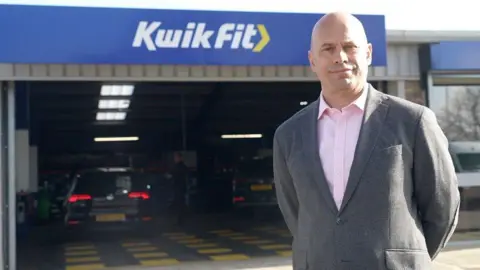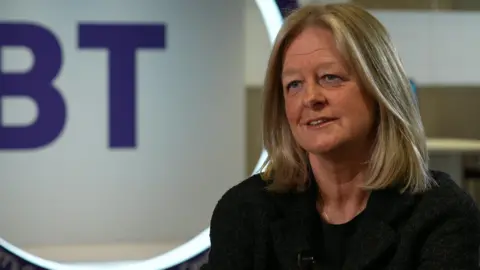ARTICLE AD BOX
Tom Espiner & Emma Smith
BBC business reporters

 Getty Images
Getty Images
Cosmetics company Lush and car repair chain Kwik Fit are among firms which have warned they will raise prices due an increase in employers' National Insurance (NI).
Other firms have told the BBC they will reduce how much profit they make, freeze hiring or in some cases cut jobs to cover the higher costs.
From Sunday, employers will have to pay NI at 15% on salaries above £5,000, instead of 13.8% on salaries above £9,100 currently.
The Treasury said the billions raised will be spent on public services, including the NHS.


Lush told the BBC that with 3,600 employees in the UK and Ireland, it would have to find an extra £2.7m per year.
Kasey Swithenbank, Lush's retail head for the UK and Ireland, said: "We are going to be taking small incremental price changes. We are taking an approach where we look at certain categories at key points of the year so hopefully our customers don't feel the full burden straight away."


Kwik Fit boss Mark Slade says the National Insurance changes will affect prices and hiring.
Kwik Fit, which employs around 7,000 people, estimates the NICs rises will cost it £6.4m.
This will have a knock-on effect on prices, and recruitment, said Mark Slade, its managing director.
"We are really careful to make sure KwikFit is always competitive and benchmarked against the people around us - but the reality is that includes increasing prices."
He added: "There will be some people who aren't replaced over the coming year and that will be in the senior levels."
What are the changes?
- The rate that employers pay in contributions will rise from 13.8% to 15% on a worker's earnings above £175 per week. The government expects about 940,000 firms to pay more, 250,000 companies to pay less, and 820,000 to see no change.
- The threshold when employers start paying the tax on each employee's salary will be reduced from £9,100 per year to £5,000.
- But Employers Allowance - the amount employers can claim back from their National Insurance bill - has been raised from £5,000 to £10,500.
BBC Breakfast contacted around 200 UK businesses and charities in March, across different industries, from sole traders to large companies to get a sense of the impact of the increase in employer National Insurance Contributions.
Some 121 completed the questionnaire and around 100 of these businesses told us they had at least an approximate idea of how much increases in employer NICSs would cost them.
The costs ranged from £1,000 to £39m depending the size of the business and the number of employees.
Around 60 of the businesses which were planning to increase the staff count before announcement said the Budget had affected these plans.
How will firms manage the rises?
BBC Breakfast's questionnaire asked employers to choose from a list of actions they would take to manage increases in NICs.
- 77 said they would pass on costs to customers in price rises
- 68 said they would freeze or reduce hiring
- 81 said they would reduce their profit margins
- 39 said they would manage increases through job losses
Businesses most frequently told us they would choose a combination of these things.


BT boss Allison Kirkby said tax changes meant BT was speeding up cost cutting it was going to do anyway
Allison Kirkby, chief executive of BT, said the tax changes, which will cost the firm £100m, will mean it speeds up job cuts it was already planning.
She added that BT is "delighted" with tax relief on infrastructure investment in the Spring Statement and UK planning reforms.
"At the moment, like the country, we are focused on getting BT back to growth," she said.
"Predictability on taxation, on regulation and on planning is super helpful for the investment that goes into infrastructure like ours, which is the digital backbone of the country."


Angela Burns says the tax changes are "really challenging".
Angela Burns is the chief executive of the Webb Hotel Group, a group of four hotels based in Sutton Coldfield in the West Midlands.
It employs just under 300 people, and she says the NICs rises alone will cost £200,000 a year, with additional minimum wage and pension costs taking that to £600,000.
"It's really tough because our labour force is the main expense in our business," she said.
"As soon as it was announced in the budget in October, we started to look at restructuring, and as people have left, we haven't re employed. So we've actually cut our workforce down from about 320 to about 280 now to prepare ourselves."
She said prices would have to be moved "slightly upwards".
"But it's a balancing act as to what customers are prepared to pay," she added.
Greg Strickland, general manager of trampoline activity firm Jump Xtreme in Bolton, said the changes added £30,000 of costs "overnight".
He said it had cut 16 hours per week off some 40-hour contracts to cover the cost.
Meanwhile Andrew Lane, managing director of Union Industries in Leeds said the firm, which makes industrial doors, shares about half its post-tax profit with employees.
"This is going to hit them," he said. "There will be less money to distribute to our employee-owners."
The government has predicted the changes will raise between £14.6bn and £18.3bn a year over five years when compensation for public sector employers is taken into account.
A Treasury spokesperson told the BBC the government was "pro-business" and that it knew the "vital importance of small businesses to our economy".
They said October's budget "took difficult decisions on tax to stabilise the public finances, including the NHS which has now seen waiting lists fall five months in a row".
They added: "We are now focused on creating opportunities for businesses to compete and access the finance they need to scale, export and break into new markets."
Additional reporting by Oliver Smith & Jennifer Meierhans

 22 hours ago
4
22 hours ago
4








 English (US) ·
English (US) ·